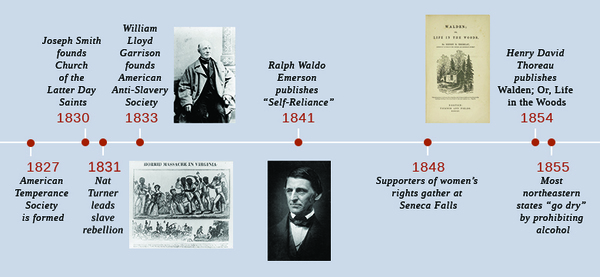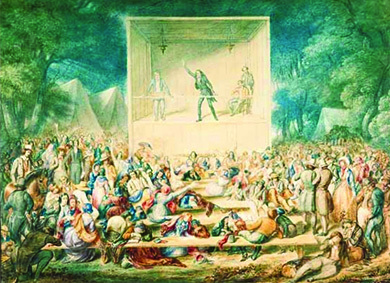| << Chapter < Page | Chapter >> Page > |

Protestantism shaped the views of the vast majority of Americans in the antebellum years. The influence of religion only intensified during the decades before the Civil War, as religious camp meetings spread the word that people could bring about their own salvation, a direct contradiction to the Calvinist doctrine of predestination. Alongside this religious fervor, transcendentalists advocated a more direct knowledge of the self and an emphasis on individualism. The writers and thinkers devoted to transcendentalism, as well as the reactions against it, created a trove of writings, an outpouring that has been termed the American Renaissance.
The reform efforts of the antebellum era sprang from the Protestant revival fervor that found expression in what historians refer to as the Second Great Awakening . (The First Great Awakening of evangelical Protestantism had taken place in the 1730s and 1740s.) The Second Great Awakening emphasized an emotional religious style in which sinners grappled with their unworthy nature before concluding that they were born again, that is, turning away from their sinful past and devoting themselves to living a righteous, Christ-centered life. This emphasis on personal salvation, with its rejection of predestination (the Calvinist concept that God selected only a chosen few for salvation), was the religious embodiment of the Jacksonian celebration of the individual. Itinerant ministers preached the message of the awakening to hundreds of listeners at outdoors revival meetings ( [link] ).

The burst of religious enthusiasm that began in Kentucky and Tennessee in the 1790s and early 1800s among Baptists, Methodists, and Presbyterians owed much to the uniqueness of the early decades of the republic. These years saw swift population growth, broad western expansion, and the rise of participatory democracy. These political and social changes made many people anxious, and the more egalitarian, emotional, and individualistic religious practices of the Second Great Awakening provided relief and comfort for Americans experiencing rapid change. The awakening soon spread to the East, where it had a profound impact on Congregationalists and Presbyterians. The thousands swept up in the movement believed in the possibility of creating a much better world. Many adopted millennialism , the fervent belief that the Kingdom of God would be established on earth and that God would reign on earth for a thousand years, characterized by harmony and Christian morality. Those drawn to the message of the Second Great Awakening yearned for stability, decency, and goodness in the new and turbulent American republic.

Notification Switch
Would you like to follow the 'U.s. history' conversation and receive update notifications?